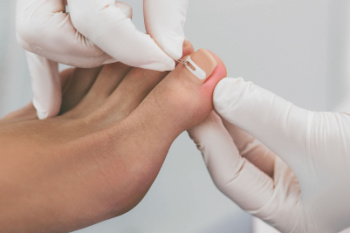
Ingrown toenails can be painful and hard to ignore, but they are often preventable with a few simple habits. Trim your toenails straight across, not curved, and avoid cutting them too short. This helps keep the nail from growing into the skin. Wear shoes that fit well and do not squeeze the toes, as tight footwear puts extra pressure on the nails. Keep your feet clean and dry to prevent infection and skin breakdown. Avoid picking at your nails or tearing them by hand. If you have thick or curved nails, consider seeing a podiatrist for proper trimming. People with diabetes or poor circulation should be especially careful, as small problems can turn serious quickly. If you notice redness, pain, or swelling near a toenail, it is suggested you see a podiatrist for appropriate treatment.
Ingrown toenails can become painful if they are not treated properly. For more information about ingrown toenails, contact one of our podiatrists of Prince William Foot & Ankle Center, PC. Our practitioners can provide the care you need to keep you pain-free and on your feet.
Ingrown Toenails
Ingrown toenails occur when a toenail grows sideways into the bed of the nail, causing pain, swelling, and possibly infection.
Causes
- Bacterial infections
- Improper nail cutting such as cutting it too short or not straight across
- Trauma to the toe, such as stubbing, which causes the nail to grow back irregularly
- Ill-fitting shoes that bunch the toes too close together
- Genetic predisposition
Prevention
Because ingrown toenails are not something found outside of shoe-wearing cultures, going barefoot as often as possible will decrease the likeliness of developing ingrown toenails. Wearing proper fitting shoes and using proper cutting techniques will also help decrease your risk of developing ingrown toenails.
Treatment
Ingrown toenails are a very treatable foot condition. In minor cases, soaking the affected area in salt or antibacterial soaps will not only help with the ingrown nail itself, but also help prevent any infections from occurring. In more severe cases, surgery is an option. In either case, speaking to your podiatrist about this condition will help you get a better understanding of specific treatment options that are right for you.
If you have any questions please feel free to contact our offices located in Gainesville and Dulles, VA . We offer the newest diagnostic and treatment technologies for all your foot and ankle needs.
